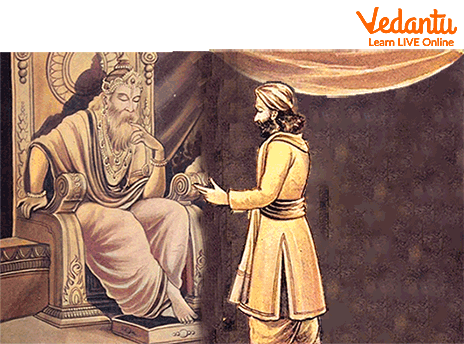Akrura Meets Dhritarashtra in English for Kids

From love, courage, truth, honesty, and wisdom to anger, cowardice, lying, deceit, ignorance, and dislikes, the Mahabharata expresses every human emotion.
All negative and illegal behaviours practised today, such as lust, narcissism, eve-teasing, etc., should not be practised.
An Overview of the Story “Akrura Meets Dhritarashtra”
Mahabharata is a significant Hindu mythological epic. It tells the story of the historical conflict between the Pandavas and the Kauravas. From this particular Akrura meets Dhritarashtra tale, we learn that good always triumphs over evil. It is a philosophic and religious tale that tells Akrura’s journey to meet Dhritarashtra. He learns all about Dhritarashtra and exchanges a few words of encouragement. Continue reading to know this epic Mahabharat story for kids in simple words.
Akrura Meets Dhritarashtra Story in English
Following Lord Krishna's instructions, Akrura travelled to Hastinapura, where he met Dhritarashtra's sons: Pandavas and the Kauravas, before attempting to learn how king Dhritarashtra was treating the former. Akrura would spend several months in Hastinapura as a result of this work.
Akrura was given a detailed account by Vidura and Kuntidevi of how Dhritarashtra's sons had attempted to destroy the Pandavas using a variety of terrible tactics and were considering committing additional crimes because they were envious of their elevated characteristics. "Do my parents and other relatives, headed by Krishna and Balarama, ever think of my sons and me, and will Krishna ever come to comfort us in our suffering," Kuntidevi begged Akrura through her tears.
Then Kuntidevi started chanting the names of Lord Krishna for her safety as well as mantras of submission to Him. "Since your boys are demigods like Dharma and Vayu, there is no reason to think that any disaster will befall them; rather, you should be confident that very soon they will get the greatest fortune," Akrura reassured Kunti Devi.
The message from Krishna and Balarama was then delivered by Akrura to king Dhritarashtra. “You have taken the throne after Pandu's death,” Akrura informed the King. “You should safeguard all of your subjects and close relationships since that is the religious duty of rulers, who must see all people equally. With such honourable conduct, you will become famous and prosperous.”
He added, “But if you behave improperly, you will only achieve disgrace in this life and be sentenced to a dreadful afterlife. A living thing gives birth on its own and dies on its own. They take pleasure in their sin and piety alone. One will undoubtedly enter hell if they are unable to comprehend their true identity and choose to maintain their offspring by engaging in unethical activities. Therefore, in order to manage one's mind and maintain equilibrium and tranquilly, one needs to learn to recognise the instability of material life, which is like a dream, an illusion, or a flight of fancy."
King Dhritarashtra responded, "O Akrura, your encouraging words are like the sweet nectar of immortality; I cannot get enough of them. However, I am biased toward my sons because of the strong attachment I have to them. Therefore, your ideas won't stick in my head. No one is able to violate the Supreme Lord's plan; his intention in ascending into the Yadu dynasty will unavoidably be realised."
Akrura returned to Mathura with permission from his loving family and friends after learning about king Dhritarashtra's attitude. There, he explained everything to Lord Krishna and Lord Balarama.

Akrura Meets Dhritarashtra
Akrura meets Dhritarashtra Summary
Children enjoy listening to Mahabharata short summary for kids. Additionally, they enjoy it better if it is an adventure story. Adventures abound throughout Mahabharat's life. There are several chapters in the Mahabharata that impart important lessons to children about morals and ethics. Children should read mythical tales because they teach valuable lessons.
Moral of Akrura Meets Dhritarashtra Story
The most crucial aspect is that there are lessons to be learnt from this Mahabharat story for kids. Truth and goodness always win in the end, miracles happen, and helping others are some important lessons Mahabharat stories teach kids.
Note to Parents
Parents can instil positive values in their children by reading stories with strong morals. These morals will come in handy when the kids become older and start living independently. Parents might use the illustrations from the Mahabharata short summary for kids to add interest to this tale.


FAQs on Akrura Meets Dhritarashtra in English for Kids
1. Did Krishna give eyesight to Dhritarashtra?
It was offered to Dhritarashtra only by Ved Vyasa, but he turned it down, saying he would not be able to see it and asked Ved Vyasa to give it to Sanjaya.
2. Why does Dhritarashtra have a blind birth?
Pandu was Ambalika's son, while Dhritrashtra was Ambika's. Vyasa was asked to impregnate Ambika and Ambalika. Ambika lowered her eyes, and Ambalika became pale throughout their union. Due to this, Pandu was physically frail, and Dhritrashtra was born blind.
3. After the Mahabharata, what happened to Dhritarashtra?
The grieving blind monarch, his wife Gandhari, sister-in-law Kunti, and half-brother Vidura departed Hastinapura for penance following the epic Mahabharata conflict. Except for Vidura, who passed away first, it is believed everyone died in a forest fire and obtained moksha.
From love, courage, truth, honesty, and wisdom to anger, cowardice, lying, deceit, ignorance, and dislikes, the Mahabharata expresses every human emotion.
All negative and illegal behaviours practised today, such as lust, narcissism, eve-teasing, etc., should not be practised.




